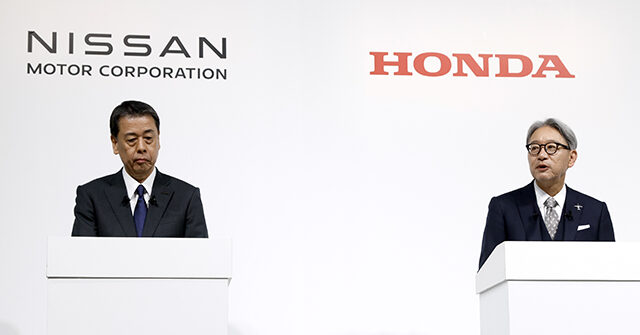Japanese automakers Nissan and Honda have announced plans to pursue a merger that could position them as the world’s third-largest automotive manufacturer by sales. Amid a significant industry shift away from fossil fuels, the partnership is designed to enhance their competitive edge against established rivals like Toyota and Volkswagen. The two companies have signed a memorandum of understanding, indicating their intent to unify their operations through the formation of a joint holding company, which will initially be helmed by Honda’s president, Toshihiro Mibe. Central to this arrangement is the preservation of each company’s brand identity while allowing for operational integration. Both companies, along with smaller alliance member Mitsubishi Motors, aim to finalize a merger agreement by June and list the new holding company on the Tokyo Stock Exchange by August 2026.
Both Nissan and Honda have faced challenges in transitioning to electric vehicles (EVs) and reducing operational costs, falling behind their global competitors. This merger is expected to create an automotive giant with a market capitalization exceeding $50 billion, enhancing their ability to compete effectively with larger firms like Toyota, which has technology partnerships with other Japanese automotive makers, including Mazda and Subaru. The motivations behind the merger also relate to a broader trend of industry consolidation, with reports emerging of Foxconn, the Taiwanese iPhone manufacturer, expressing interest in acquiring shares of Nissan from its alliance partner, Renault. However, Nissan CEO Makoto Uchida has indicated there has been no direct approach regarding such a move.
The merger highlights the ongoing struggles that Nissan has faced in recent years, particularly following the high-profile scandal involving former chairman Carlos Ghosn, whose arrest in 2018 and subsequent flight to Lebanon unsettled the company. Ghosn has since labeled the proposed merger a “desperate move,” suggesting that it stems from the financial difficulties Nissan is encountering. Despite such criticisms, experts believe Honda stands to gain valuable assets through the merger, such as Nissan’s expertise in large body-on-frame SUVs and established capabilities in electric vehicle technologies.
With the merger proposal underway, both companies grapple with pressing financial issues. Nissan recently announced a significant workforce reduction of about 6% and 20% cut to its global production capacity amid declining profitability. Coupled with these cuts, Nissan’s CEO Uchida acknowledged the dire circumstances of the company, noting needed improvements in efficiency and responsiveness to evolving market dynamics. Fitch Ratings has downgraded Nissan’s credit outlook, citing concerns over profitability stemming from price adjustments, particularly in the North American market. Nevertheless, the company maintains a strong financial structure and substantial cash reserves to address its challenges.
Investors have shown renewed interest in both companies following the announcement of merger talks, with Nissan’s shares experiencing increases of more than 20% in value. Conversely, Honda has seen its net profit decrease nearly 20% in the first half of its fiscal year as sales in critical markets like China have faltered. These financial fluctuations indicate the delicate balance both companies must strike as they navigate the transition towards electrification and changing consumer preferences. The proposed merger could lead to efficiencies and enhanced capabilities in EV development, increasing market competitiveness.
As the automotive landscape grows increasingly competitive, Japanese companies are considering larger integrations to sustain their market position amidst rapid technological changes, particularly in storage technologies and software. The Cabinet Secretary emphasized the need for Japanese automakers to innovate and adapt to remain viable in a fast-evolving industry. This sentiment echoes the larger narrative of consolidation and strategic collaborations across the automotive sector, reflecting a necessity in an environment increasingly dominated by sustainability and technological advancements. The future harbors uncertainties for both Nissan and Honda as they pursue their ambitious merger while navigating existing operational challenges and a swiftly changing market.

